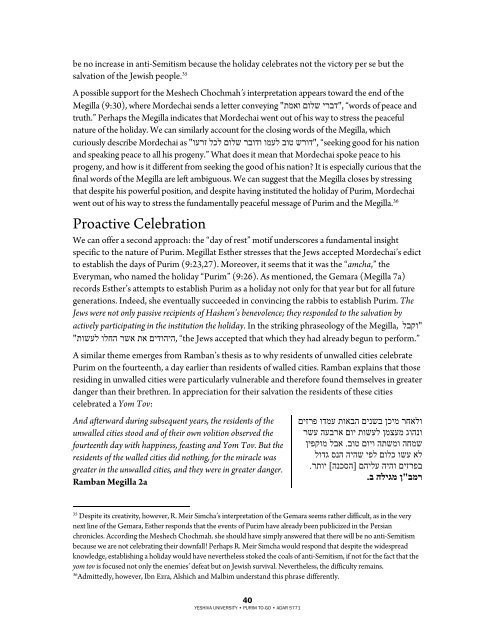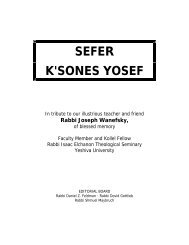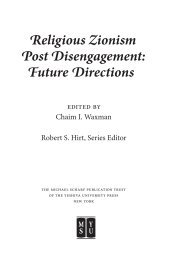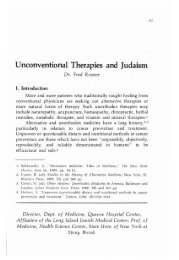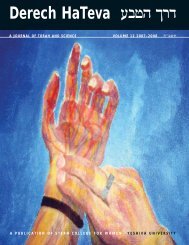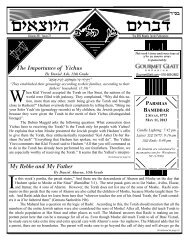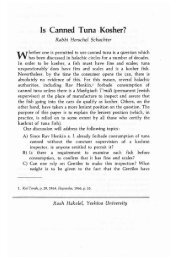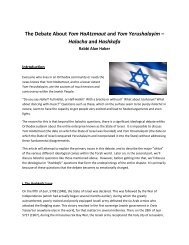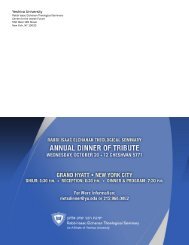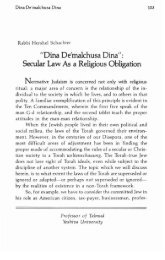yeshiva university • purim to-go • adar 5771 - YU Torah Online
yeshiva university • purim to-go • adar 5771 - YU Torah Online
yeshiva university • purim to-go • adar 5771 - YU Torah Online
- No tags were found...
Create successful ePaper yourself
Turn your PDF publications into a flip-book with our unique Google optimized e-Paper software.
e no increase in anti-Semitism because the holiday celebrates not the vic<strong>to</strong>ry per se but thesalvation of the Jewish people. 35A possible support for the Meshech Chochmah’s interpretation appears <strong>to</strong>ward the end of theMegilla (9:30), where Mordechai sends a letter conveying " ", “words of peace andtruth.” Perhaps the Megilla indicates that Mordechai went out of his way <strong>to</strong> stress the peacefulnature of the holiday. We can similarly account for the closing words of the Megilla, whichcuriously describe Mordechai as " ", “seeking <strong>go</strong>od for his nationand speaking peace <strong>to</strong> all his progeny.” What does it mean that Mordechai spoke peace <strong>to</strong> hisprogeny, and how is it different from seeking the <strong>go</strong>od of his nation? It is especially curious that thefinal words of the Megilla are left ambiguous. We can suggest that the Megilla closes by stressingthat despite his powerful position, and despite having instituted the holiday of Purim, Mordechaiwent out of his way <strong>to</strong> stress the fundamentally peaceful message of Purim and the Megilla. 36דברי שלום ואמתדורש טוב לעמו ודובר שלום לכל זרעוProactive CelebrationWe can offer a second approach: the “day of rest” motif underscores a fundamental insightspecific <strong>to</strong> the nature of Purim. Megillat Esther stresses that the Jews accepted Mordechai’s edict<strong>to</strong> establish the days of Purim (9:23,27). Moreover, it seems that it was the “amcha,” theEveryman, who named the holiday “Purim” (9:26). As mentioned, the Gemara (Megilla 7a)records Esther’s attempts <strong>to</strong> establish Purim as a holiday not only for that year but for all futuregenerations. Indeed, she eventually succeeded in convincing the rabbis <strong>to</strong> establish Purim. TheJews were not only passive recipients of Hashem’s benevolence; they responded <strong>to</strong> the salvation byactively participating in the institution the holiday. In the striking phraseology of the Megilla, "" , “the Jews accepted that which they had already begun <strong>to</strong> perform.”וקבלהיהודים את אשר החלו לעשותA similar theme emerges from Ramban’s thesis as <strong>to</strong> why residents of unwalled cities celebratePurim on the fourteenth, a day earlier than residents of walled cities. Ramban explains that thoseresiding in unwalled cities were particularly vulnerable and therefore found themselves in greaterdanger than their brethren. In appreciation for their salvation the residents of these citiescelebrated a Yom Tov:And afterward during subsequent years, the residents of theunwalled cities s<strong>to</strong>od and of their own volition observed thefourteenth day with happiness, feasting and Yom Tov. But theresidents of the walled cities did nothing, for the miracle wasgreater in the unwalled cities, and they were in greater danger.Ramban Megilla 2aולאחר מיכן בשנים הבאות עמדו פרזיםונהוג מעצמן לעשות יום ארבעה עשרשמחה ומשתה ויום טוב. אבל מוקפיןלא עשו כלום לפי שהיה הנס גדולבפרזים והיה עליהם [הסכנה] יותר.רמב"ן מגילה ב.35Despite its creativity, however, R. Meir Simcha’s interpretation of the Gemara seems rather difficult, as in the verynext line of the Gemara, Esther responds that the events of Purim have already been publicized in the Persianchronicles. According the Meshech Chochmah. she should have simply answered that there will be no anti-Semitismbecause we are not celebrating their downfall! Perhaps R. Meir Simcha would respond that despite the widespreadknowledge, establishing a holiday would have nevertheless s<strong>to</strong>ked the coals of anti-Semitism, if not for the fact that theyom <strong>to</strong>v is focused not only the enemies’ defeat but on Jewish survival. Nevertheless, the difficulty remains.36Admittedly, however, Ibn Ezra, Alshich and Malbim understand this phrase differently.40YESHIVA UNIVERSITY <strong>•</strong> PURIM TO-GO <strong>•</strong> ADAR <strong>5771</strong>


